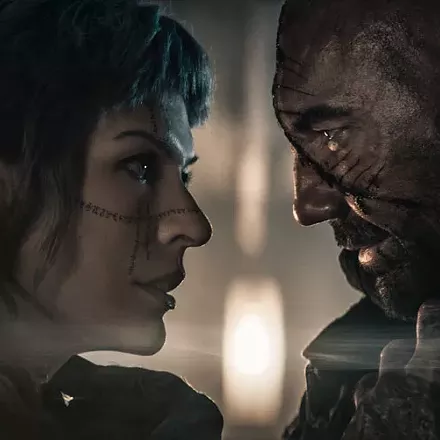
- Lionsgate Films
For decades, producers and filmmakers have been trying to solve a challenging dilemma: How to make a James Bond movie without James Bond? Since 1962, the film franchise built on Ian Fleming's British superspy has established a reliably crowd-pleasing formula: exotic locations, over-the-top action, beautiful women and a dashing, unflappable hero. So while certain legal niceties preclude just anyone from making a movie about James Bond, creators have tried with varying degrees of success—and a rare home-run like the Fast & Furious series—to duplicate the formula. If you can't serve them a Coke, at least serve them a distractingly similar off-brand equivalent.
It's not entirely fair to suggest that American Assassin is trying to be ersatz Bond, since many members of the creative team—including director and former Homeland executive producer Michael Cuesta, and co-screenwriter and The Americans writer/producer Stephen Schiff—have experience with grittier, more complex approaches to international espionage. Yet in its attempt to tell the origin story of author Vince Flynn's counter-terrorism agent protagonist Mitch Rapp, American Assassin seems balanced unsteadily between serious political thriller and action spectacle. This is what happens when somebody tries to take a James Bond movie and make it, you know, about something.
The story opens on a sunny Spanish beach, where young Mitch (Dylan O'Brien) is about to have the happiest day of his life after proposing to his girlfriend, Katrina (Charlotte Vega). Ah, but happiness is not to be: A terrorist attack leaves Katrina dead, and 18 months later, Mitch has committed himself to infiltrating the cell responsible and getting revenge. He also catches the attention of U.S. intelligence operatives (Sanaa Lathan and David Suchet), who recognize his unique skills and passion, and send him to train with badass mentor Stan Hurley (Michael Keaton). And just in time, too, since a mysterious figure known only as Ghost (Taylor Kitsch) appears to be helping Iran obtain stolen plutonium to build a nuclear weapon.
The timeline for Mitch's autodidactic transformation might be just a tad improbable—it basically takes him just over a year to turn himself from Random Scruffy American Dudebro into Batman—but it allows the efficiency of throwing him head-first into the no-posers-allowed training program led by Keaton's Hurley. Between the virtual-reality target-practice simulations, there are plenty of through-gritted-teeth lessons about killing and trying not to be killed, all of which is meant to establish an emotional connection between Mitch and Hurley. That's something James Bond movies aren't generally all about: giving Bond a surrogate father figure.
There are, however, plenty of establishing shots of cities like Istanbul and Rome, and at least one possible femme fatale in the form of an agent (Shiva Negar) whose loyalties might be unclear. Kitsch provides the requisite villain who has a lot to say about how justifiable his actions are—it's not a far cry from Steve Coogan and Rob Brydon's The Trip to Italy shtick about Bond villains who purr "we're not so very different"—on the way to a big showdown between Mitch and Ghost on a runaway speedboat that also happens to be carrying an armed-and-counting-down nuclear warhead. Those are big stakes, 007-style.
But American Assassin also seems determined to interject big ideas about who the bad guys really are in geopolitics, and proving its hardcore bona fides by including an extended sequence in which Hurley is tortured with pulled fingernails and car batteries. It's a philosophical burden that the movie isn't remotely equipped to carry, not when it also wants to be the kind of movie where the good guy and bad guy duke it out on a runaway, nuke-laden speedboat.
Even more unfortunate, however, is the absence of charismatic leading men. O'Brien's a perfectly serviceable actor, but he never has the presence required to be convincing as a killer—even when wearing the beard that suggests a college junior cosplaying as his dorm room Che poster—nor does Kitsch convey the requisite haunted nihilism. Keaton gets to play the kind of crazed intensity that brings out the best in him, but he's got nobody to play off of. American Assassin keeps stumbling through an uncomfortable middle ground between would-be blockbuster wildness and chin-stroking intensity, never really working as either one. It's fakin', not stirring.


